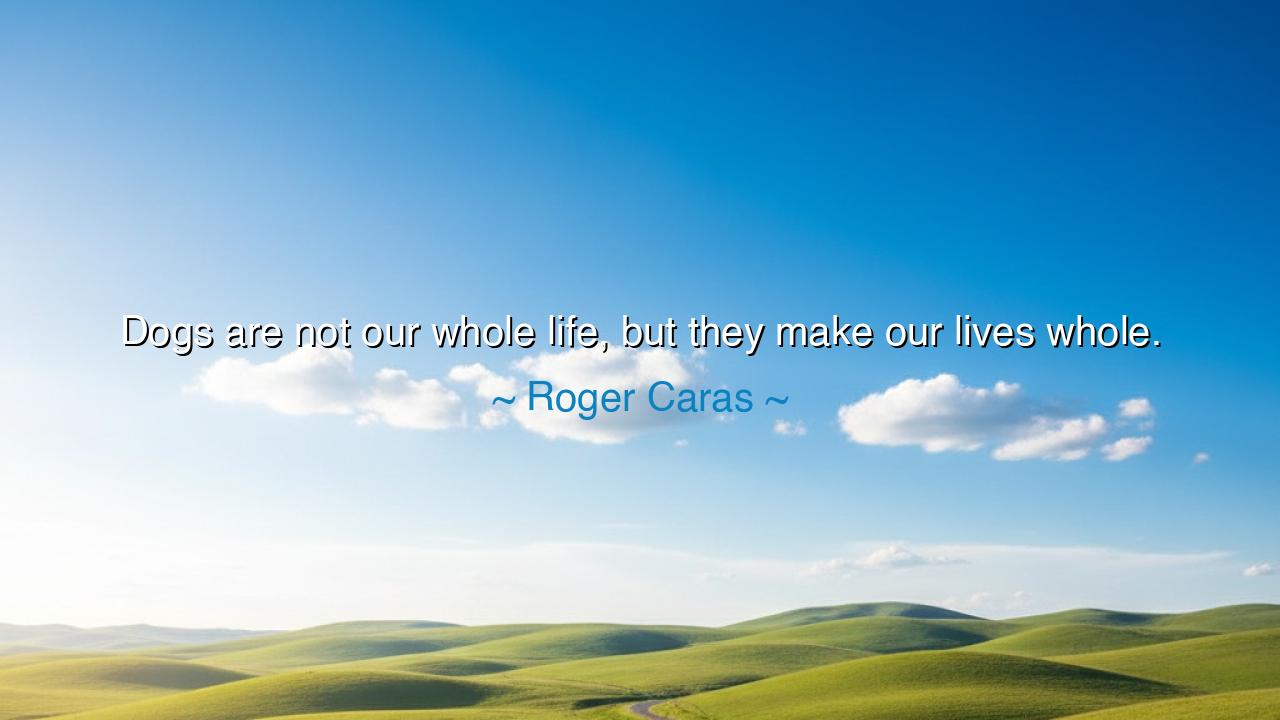
Dogs are not our whole life, but they make our lives whole.






Hear now the gentle yet powerful words of Roger Caras: “Dogs are not our whole life, but they make our lives whole.” At first glance, these words seem simple, but within them lies a deep river of truth about companionship, loyalty, and the quiet ways in which love shapes the soul. For though dogs are but creatures among us, they carry within their eyes a light that heals, that steadies, and that binds the broken pieces of our hearts into harmony.
For indeed, our lives are vast. They are filled with work, with dreams, with struggles, with the endless march of time. Yet in all these pursuits, something remains missing—an element of joy that does not come from wealth, nor victory, nor even the praise of men. Into this emptiness comes the humble dog, not to command, not to demand, but to give. With wagging tail and unspoken devotion, the dog transforms ordinary days into something sacred. Thus, though they are not our whole existence, they become the thread that completes the fabric of life, making it whole.
Consider the tale of Greyfriars Bobby, the faithful little terrier of Edinburgh. When his master, a night watchman, died and was laid in Greyfriars churchyard, Bobby refused to abandon him. For fourteen years, until his own death, the dog kept watch by the grave, enduring seasons of snow, rain, and sun. The people of the city came to know him, to honor him, to see in him a living parable of loyalty and love. Was Bobby the whole of Edinburgh’s life? No. Yet did his devotion bring wholeness, reminding all who beheld him of what it means to love beyond death? Yes. Such is the truth Caras speaks: dogs may not be all, but they complete what is lacking.
And how often have we seen it in the lives of soldiers, weary from war, whose trembling hands are steadied by the touch of a service dog? Or the child, fearful and withdrawn, who finds courage through the companionship of a gentle pup? These creatures do not solve the world’s burdens, nor erase life’s trials. But in their presence, life feels less fractured, less cold. They bring wholeness not by changing the world, but by changing our hearts.
The wisdom of Caras also warns us against idolatry. He reminds us: dogs are not our whole life. They cannot replace human duty, nor the search for truth, nor the building of justice. To elevate them to gods would be folly. Yet, to deny their role in making us whole would be blindness. Their gift is balance, a harmony between labor and rest, between striving and loving. They remind us of the joy of simple things: a walk beneath the sky, a shared meal, a moment of stillness.
From this we learn a clear lesson: wholeness is not found in greatness alone, but in love. And love often comes to us in humble forms, wagging its tail at the door. To make your life whole, do not despise the small companions, the quiet joys, the faithful presences. Whether dog or human friend, cherish those who bring light to your path. For they may not be the whole of life, but without them, life is incomplete.
So I say to you, children of tomorrow: honor the bond you share with your animals. Care for them as they care for you. Let their loyalty teach you loyalty, let their joy teach you gratitude, and let their wholeness remind you of what truly matters. For in loving them, you learn how to live fully—not in fragments, but in unity of heart, mind, and soul. And thus, though they are but creatures, dogs make our lives whole.






AAdministratorAdministrator
Welcome, honored guests. Please leave a comment, we will respond soon